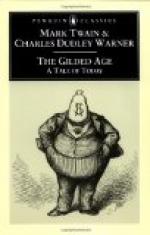“Why, yes, Miss, of course, in a great enterprise for the benefit of the community there will little things occur, which, which—and, of course, the poor ought to be looked to; I tell my wife, that the poor must be looked to; if you can tell who are poor—there’s so many impostors. And then, there’s so many poor in the legislature to be looked after,” said the contractor with a sort of a chuckle, “isn’t that so, Mr. Bolton?”
Eli Bolton replied that he never had much to do with the legislature.
“Yes,” continued this public benefactor, “an uncommon poor lot this year, uncommon. Consequently an expensive lot. The fact is, Mr. Bolton, that the price is raised so high on United States Senator now, that it affects the whole market; you can’t get any public improvement through on reasonable terms. Simony is what I call it, Simony,” repeated Mr. Bigler, as if he had said a good thing.
Mr. Bigler went on and gave some very interesting details of the intimate connection between railroads and politics, and thoroughly entertained himself all dinner time, and as much disgusted Ruth, who asked no more questions, and her father who replied in monosyllables:
“I wish,” said Ruth to her father, after the guest had gone, “that you wouldn’t bring home any more such horrid men. Do all men who wear big diamond breast-pins, flourish their knives at table, and use bad grammar, and cheat?”
“O, child, thee mustn’t be too observing. Mr. Bigler is one of the most important men in the state; nobody has more influence at Harrisburg. I don’t like him any more than thee does, but I’d better lend him a little money than to have his ill will.”
“Father, I think thee’d better have his ill-will than his company. Is it true that he gave money to help build the pretty little church of St. James the Less, and that he is, one of the vestrymen?”
“Yes. He is not such a bad fellow. One of the men in Third street asked him the other day, whether his was a high church or a low church? Bigler said he didn’t know; he’d been in it once, and he could touch the ceiling in the side aisle with his hand.”
“I think he’s just horrid,” was Ruth’s final summary of him, after the manner of the swift judgment of women, with no consideration of the extenuating circumstances. Mr. Bigler had no idea that he had not made a good impression on the whole family; he certainly intended to be agreeable. Margaret agreed with her daughter, and though she never said anything to such people, she was grateful to Ruth for sticking at least one pin into him.
Such was the serenity of the Bolton household that a stranger in it would never have suspected there was any opposition to Ruth’s going to the Medical School. And she went quietly to take her residence in town, and began her attendance of the lectures, as if it were the most natural thing in the world. She did not heed, if she heard, the busy and wondering gossip of relations and acquaintances, gossip that has no less currency among the Friends than elsewhere because it is whispered slyly and creeps about in an undertone.




